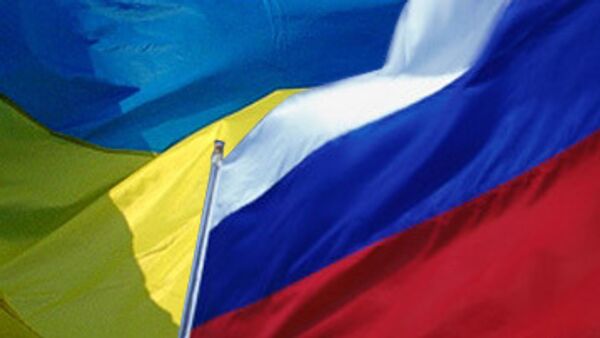KIEV. (Viktor Avdeyenko, RIA Novosti) - On Tuesday Russian President Dmitry Medvedev posted a new entry on his video blog to report sending a letter to his Ukrainian counterpart where he called Ukraine's policy under President Yushchenko a divergence from the principle of developing friendship and partnership with Russia.
President Medvedev also added that he decided to refrain from sending a new Russian ambassador to Ukraine.
Deputy Secretary of Ukraine's National Security and Defence Council Dmytro Vydrin believes that it is Ukrainian and Russian political institutions that bear responsibility for the deteriorated relations between Kiev and Moscow.
"The relations are at a low. There have been no top-level meetings, with almost all joint projects frozen. If one analyzes the bilateral cooperation in specific areas, one will find grave shortcomings. The political structures are to blame for this," Vydrin said.
"I do not know any conflict where only one party is guilty," Vydrin said. He added that relations between two countries are not normally confined only to their presidents.
Members of Ukraine's oppositional Party of Regions consider Medvedev's decision to postpone sending an ambassador to Ukraine a lamentable, but absolutely consistent step.
"As a politician and a Ukrainian citizen, I see Russia's step as both regrettable and understandable at the same time; it is possible to justify this move since today Russia has no partner it can interact with," vice chairman of the Party of Regions Hanna Herman said.
The party's leader, Viktor Yanukovych, pledged that if he wins the presidential election in January 2010 - and he has the best chance to win - he will restore neighbourly relations with Russia.
The press service of the Party of Regions cited its leader as saying, "Unfortunately, under the present government there is little hope that relations with Russia will improve. That's why our first job when we come to power will be a restoration of normal, neighbourly, equal and mutually beneficial relations with our strategic partner, Russia. Such relations will offer new vistas for both states."
The Communist Party of Ukraine also shares the Russian president's criticism of the Ukrainian head of state.
"Medvedev simply stated an obvious fact, palpable to many people," one of the Communist Party leaders Olexander Holub said. As he put it, the Ukrainian Presidential Secretariat "has initiated a crusade against everything that unites us."
"This attitude does not reflect the sentiments of the majority of people, and splits Ukrainian society from the inside," Holub added.
Deputy Speaker of the Ukrainian parliament, Mykola Tomenko from the Bloc of Yulia Tymoshenko is sure that Medvedev's rigid statement is a testament to the Kremlin's intention to influence the election campaign in Ukraine.
In Tomenko's view, Medvedev's team has outlined a number of issues they regard critical in the forthcoming election campaign in Ukraine. "Drawing attention to the issues the Russian president highlighted in his statement is virtually a bid for intended participation in the presidential election campaign," Tomenko noted.
Member of the pro-presidential party Our Ukraine-People's Self-Defense, Andry Paruby shares Tomenko's view.
"This statement marks the beginning of the presidential election campaign in Ukraine and the Kremlin's participation in it. This is a new wave in Russia's media campaign against Ukraine and its government," the MP said.
Head of the Executive Committee of the Center for Applied Political Studies Penta Volodymyr Fesenko called the Russian president's statement a rigid political demarche, comparable to recalling a mission's head.
At the same time, Fesenko believes that Medvedev had grounds for such a statement: First, Russia is going to influence the presidential election campaign in Ukraine in January 2010, and second, Russia intends to continue channeling political developments in the post-Soviet republics.
"Medvedev has sent a clear message to all Ukrainian politicians that Russia is unwilling to cooperate with President Yushchenko. Medvedev has outlined the issues that Russia sees as significant and wishes to be altered. In addition, Russia has signaled a rigid policy in the post-Soviet republics," Fesenko said.
Ukraine's Foreign Ministry hasn't commented on Medvedev's statement saying that it is President Yushchenko's prerogative.
"Since the letter is addressed to the president, he is the one to give impression and comments," Ukraine's acting Foreign Minister Volodymyr Khandogy said.
Meanwhile, since Viktor Chernomyrdin was relieved of his post as the Russian ambassador to Ukraine on June 11, the Russian Embassy in Kiev has continued working as usual.
"The embassy continues working actively, as it used to. We hold our scheduled meetings and fulfill the tasks Moscow has commissioned us with," Russia's acting Charge d'Affaires in Ukraine, Vsevolod Loskutov told RIA Novosti.
The opinions expressed in this article are the author's and do not necessarily represent those of RIA Novosti.

